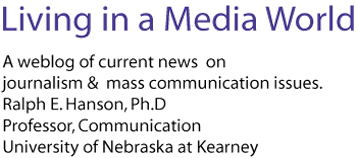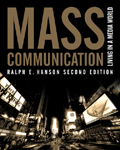
rhanson40@gmail.com
Chapter-By-Chapter
Readings and Links
for Mass Communication, Second Edition
Now Available

 |
Questions, comments or suggested links? Contact me at:
rhanson40@gmail.com Chapter-By-Chapter |
|||
 |
||||
Looking for Student BlogsI'm always looking for links to blogs being written by student journalists. If you have one, or know someone who does, drop me a note! Second Edition Available Now!The second edition of Mass Communication: Living in a Media World is now available at the very student-friendly price of $45. (Yes, the new edition sells for less than used copies often do of the first edition.) It features a newly strengthened media literacy focus, greater depth on a number of topics, extensive coverage of "long-tail" media, and new chapters on media effects and global media. For more information, visit the CQ Press website. Sorry for the lack of updates lately. I am getting ready to move to Kearney, Nebraska, and I'm afraid there will be very few posts until I get settled down there. So watch for Living in a Media World to resume regular publication in late July. June 20, 2008Questions Worth Asking (Maybe)
June 17, 2008Summer Movie Update - Iron Man Edition
May 2008On The Move Wednesday - April 30, 2008So Maybe Posting EveMany of you remember when the rything To The Web Isn't Always The Best Idea
Tuesday - April 29, 2008Questions Worth Asking (Maybe)
Monday - April 28, 2008Truths Four & Five Dept. - Video Game Fears Remind Us Of Horror Comics The book, and the story on it, seem particularly timely because all of the critics of media and youth culture are getting their collective undies in a knot over the release of the latest Grand Theft Auto game. The Grand Theft Auto series glorifies crime, sex, and violence in much the same way as an R-rated movie might. And while the games all carry the "M" video game rating, which is supposed to keep them from being sold to teens, they are among the most popular games among kids. Interestingly, the New York Times calls it a "violent, intelligent, profane, endearing, obnoxious, sly, richly textured and thoroughly compelling work of cultural satire disguised as fun." Interestingly enough, one of the creators of the latest GTA game says that it is "too intense" for kids. He's quoted in the Washington Post as saying: "If you let your child play this game, you're a bad parent," he said. "The thing is, Rockstar does not want kids playing this game." The version of the game released in Australia and New Zealand has been edited down to a more PG-13 type level. I understand why parents object to the games (I won't let my 12-year-old play GTA games), but I think there are some fascinating parallels between the fears of comics in the 1950s and the fears of video games in the 2000s. (Or perhaps the similarity is between the folks who like to score easy points by criticizing them!) Fantagraphics has posted a brief excerpt from Hajdu lecture during which he shows a sample of a 50s-era anti-comic propaganda film to YouTube. The quality isn't great, but it's a fun example. Thursday - April 24, 2008Media News You Might Have Missed Dept.
Monday - April 21, 2008Joe Jackson's Jive's Still Jumping
Wednesday - April 16, 2008Just Because It's Non-Fiction Doesn't Mean It's True Dept. - Well, There Were Kids At MIT Who Played Blackjack I enjoyed the book immensely when I first read it several years ago, and I liked the movie, too. While I couldn't remember the exact details of the book, it was clear that the movie makers had taken a lot of liberties with the details of Mezrich's book. For example, the protagonist of BDTH was Asian American, the hero of the movie was white. Details, details.... But the differences sent me online to remind me how the book turned out, and to see if I could find out what happened to the main characters. What I discovered was not particularly surprising, given the spate of recent fictional non-fiction books. As near as I can tell, it is true that there were kids at MIT who used a team-approach to counting and playing blackjack, and they did get kicked out of casinos. Beyond that, an article from Boston Magazine raises a lot of questions of how much of Mezrich's book was factually correct, how much of it was based on "composites," and how much of it was flat-out mad up. Similar questions were raised in a recent Boston Globe article titled "House of Cards." Poynter Institute's Roy Peter Clark tells the Globe that the real problem with books like BDTH is that they tend to blur the line between what is real and what was made up: When the public learns that a small piece of a supposedly nonfiction story has been fictionalized, they begin to doubt everything in that story, and when they begin to doubt a particular story then the doubts occur in their mind about whether they can trust any work, or any work of nonfiction Monday - April 14, 2008Schools, Students, Legislatures Complain About Textbook Prices
A number of "solutions" to this problem have been proposed, including requirements that professors order their books early enough that bookstores will know whether they can buy back old copies, promotion of e-textbooks, laws that require publishers to tell professors how much their books really cost, and laws that would require publishers to inform faculty on how much a book has been updated with a new edition. I might note (blatant commercial plug) that the second edition of my textbook Mass Communication: Living in a Media World covered issues in greater depth than did the first edition, eliminated color photos, controlled production costs, and sells for about half the price of the first edition. Living in a Media World Archive |
Ralph Hanson's
|
|